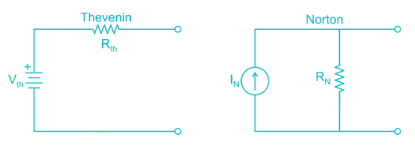Railways Exam > Railways Questions > Norton’s theorem when applied to DC cir...
Start Learning for Free
Norton’s theorem when applied to DC circuit results in:
- a)A voltage source alone
- b)A voltage source with a resistance in series
- c)A current source with resistance in parallel
- d)A current source alone
Correct answer is option 'C'. Can you explain this answer?
| FREE This question is part of | Download PDF Attempt this Test |
Verified Answer
Norton’s theorem when applied to DC circuit results in:a)A volta...
Norton’s theorem is applied to the DC circuits, it will result in a current source with resistance in parallel.
Thevenin’s theorem is applied to the DC circuits, it will result in a voltage source with a resistance in series.

Thevenin’s theorem is applied to the DC circuits, it will result in a voltage source with a resistance in series.


|
Explore Courses for Railways exam
|

|
Similar Railways Doubts
Norton’s theorem when applied to DC circuit results in:a)A voltage source aloneb)A voltage source with a resistance in seriesc)A current source with resistance in paralleld)A current source aloneCorrect answer is option 'C'. Can you explain this answer?
Question Description
Norton’s theorem when applied to DC circuit results in:a)A voltage source aloneb)A voltage source with a resistance in seriesc)A current source with resistance in paralleld)A current source aloneCorrect answer is option 'C'. Can you explain this answer? for Railways 2024 is part of Railways preparation. The Question and answers have been prepared according to the Railways exam syllabus. Information about Norton’s theorem when applied to DC circuit results in:a)A voltage source aloneb)A voltage source with a resistance in seriesc)A current source with resistance in paralleld)A current source aloneCorrect answer is option 'C'. Can you explain this answer? covers all topics & solutions for Railways 2024 Exam. Find important definitions, questions, meanings, examples, exercises and tests below for Norton’s theorem when applied to DC circuit results in:a)A voltage source aloneb)A voltage source with a resistance in seriesc)A current source with resistance in paralleld)A current source aloneCorrect answer is option 'C'. Can you explain this answer?.
Norton’s theorem when applied to DC circuit results in:a)A voltage source aloneb)A voltage source with a resistance in seriesc)A current source with resistance in paralleld)A current source aloneCorrect answer is option 'C'. Can you explain this answer? for Railways 2024 is part of Railways preparation. The Question and answers have been prepared according to the Railways exam syllabus. Information about Norton’s theorem when applied to DC circuit results in:a)A voltage source aloneb)A voltage source with a resistance in seriesc)A current source with resistance in paralleld)A current source aloneCorrect answer is option 'C'. Can you explain this answer? covers all topics & solutions for Railways 2024 Exam. Find important definitions, questions, meanings, examples, exercises and tests below for Norton’s theorem when applied to DC circuit results in:a)A voltage source aloneb)A voltage source with a resistance in seriesc)A current source with resistance in paralleld)A current source aloneCorrect answer is option 'C'. Can you explain this answer?.
Solutions for Norton’s theorem when applied to DC circuit results in:a)A voltage source aloneb)A voltage source with a resistance in seriesc)A current source with resistance in paralleld)A current source aloneCorrect answer is option 'C'. Can you explain this answer? in English & in Hindi are available as part of our courses for Railways.
Download more important topics, notes, lectures and mock test series for Railways Exam by signing up for free.
Here you can find the meaning of Norton’s theorem when applied to DC circuit results in:a)A voltage source aloneb)A voltage source with a resistance in seriesc)A current source with resistance in paralleld)A current source aloneCorrect answer is option 'C'. Can you explain this answer? defined & explained in the simplest way possible. Besides giving the explanation of
Norton’s theorem when applied to DC circuit results in:a)A voltage source aloneb)A voltage source with a resistance in seriesc)A current source with resistance in paralleld)A current source aloneCorrect answer is option 'C'. Can you explain this answer?, a detailed solution for Norton’s theorem when applied to DC circuit results in:a)A voltage source aloneb)A voltage source with a resistance in seriesc)A current source with resistance in paralleld)A current source aloneCorrect answer is option 'C'. Can you explain this answer? has been provided alongside types of Norton’s theorem when applied to DC circuit results in:a)A voltage source aloneb)A voltage source with a resistance in seriesc)A current source with resistance in paralleld)A current source aloneCorrect answer is option 'C'. Can you explain this answer? theory, EduRev gives you an
ample number of questions to practice Norton’s theorem when applied to DC circuit results in:a)A voltage source aloneb)A voltage source with a resistance in seriesc)A current source with resistance in paralleld)A current source aloneCorrect answer is option 'C'. Can you explain this answer? tests, examples and also practice Railways tests.

|
Explore Courses for Railways exam
|

|
Suggested Free Tests
Signup for Free!
Signup to see your scores go up within 7 days! Learn & Practice with 1000+ FREE Notes, Videos & Tests.























